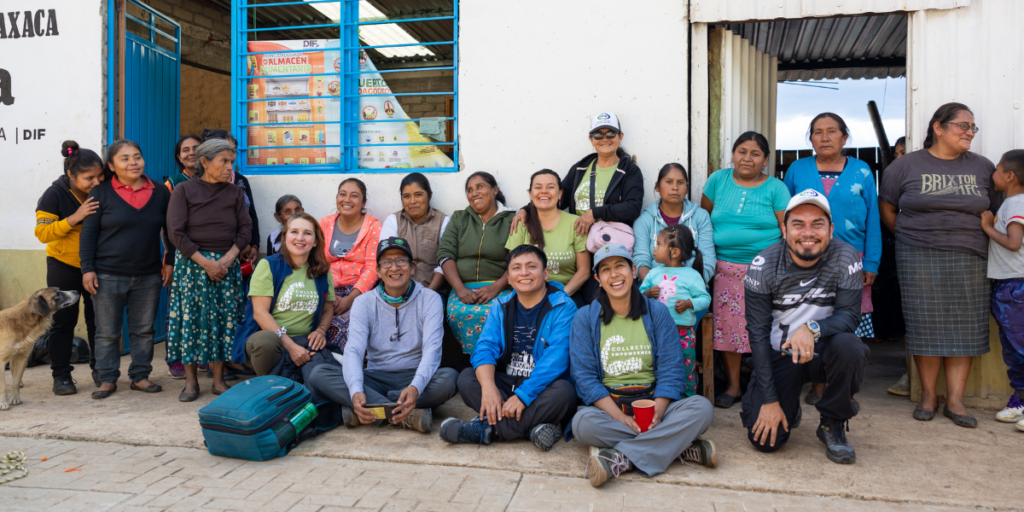What does an anti-colonial knowledge exchange look like? This concept was exemplified during a transformative 10-day knowledge exchange held in Oaxaca, Mexico. Facilitated by Green Empowerment, organized by Proyectos Para Un Futuro Mejor, and funded by the Vatheuer Family Foundation, this exchange brought together 16 dedicated participants from diverse corners of Latin America, including Nicaragua, Mexico, Peru, Ecuador, and Colombia. The aim? To establish connections, gain insights from each other, and collectively empower local communities by sharing expertise. We are grateful to be welcomed by the local and Indigenous communities with whom we engaged in this shared endeavor.
Collective Empowerment in Action
With their diverse roles as community leaders, directors, and technicians, the participants came together to explore community-based water management through multiple lenses. Cross-cutting issues like gender and climate change were interwoven into discussions, emphasizing their importance in shaping sustainable solutions. Case in point: in this 30 second video where Peruvian leader, Estefanía Urbina, describe the significance of women’s participation in community decision-making for constructing water systems:
The Key to Success
One of the key drivers of this knowledge exchange’s success was its unique methodology. Designed and facilitated by Green Empowerment, our methodology aimed to exchange local knowledge while integrating technical expertise. This hands-on event immersed participants in tangible water initiatives with local Oaxacan communities. Participants visited farmer field schools, water projects, water and energy infrastructure accompanied with water committees, local partners and authorities. Through a combination of personal reflections, group exercises, and interactive activities, participants were actively engaged in their own learning process. Our methodology emphasized inclusivity and intercultural dialogue, promoting participation of women leaders and local Indigenous communities of Oaxaca, fostering collaboration, and acknowledging playfulness in co-creation. As the days unfolded, the enthusiasm grew, and participants became eager to share insights and absorb the wisdom of their counterparts.
“Every challenge and problem portrayed during the exchange visits had different views from participants… The exchange generated bonds among participants and reminded all that learning is an iterative experience.”
Sebastián Salgado Troya, Green Empowerment Latin America Program Director

South to South Knowledge Exchange in Action
This exchange went the extra mile by immersing participants in real-life experiences that showcased the importance of community coordination and involvement. Notably, the visit to El Tlacuache watershed, where 14 communities access the water. Currently each community has their own intake along the river, creating water access issues that echo challenges seen throughout the US – such as on the high profile Colorado river. Exchange participants worked directly with local community members to understand the challenge and start to explore possible solutions – sharing their own experiences of building community consensus and coordination in their home countries.
Our exploration also extended to Santa María Tlahuitoltepec, where we learned about the local governing structure “usos y costumbres,” in which Indigenous communities have legal autonomy and govern themselves using traditional customs and practices. By tapping into Indigenous’ leaders , our learning deepened significantly, yielding invaluable discussions and insights.

Leading with Our Core Philosophy
At the heart of the knowledge exchange lies a cornerstone of Green Empowerment’s work: collective empowerment, rooted in the belief that knowledge is a shared resource and true empowerment emerges through mutual learning, equality, and respect. During the Oaxaca knowledge exchange, all participants shared information on a level playing field, ensuring equal contribution and exchange. This anti-colonial approach challenges the traditional top-down knowledge transfer from the Global North to the Global South, and instead, values the expertise of local organizations and communities.
In alignment with Green Empowerment’s 25-year vision, our commitment remains steadfast in fostering collective empowerment to amplify our impact and elevate global partners. The knowledge exchange in Oaxaca was a testament to the power of collective empowerment. It showcased the strength that emerges when organizations collaborate as equals, recognizing the knowledge and expertise that each brings to the table. The connections among participants will undoubtedly ripple outward, impacting the communities they serve and amplifying voices that are often overlooked. Hear the heartfelt farewell remarks from María del Pilar Useda President of the Association of Women and Farming Families of Quitasol, Guadalupe in Santander, Colombia:
Interested in hearing more from participants? Check out the Oaxaca Knowledge Exchange 2023 video series.
Many thanks to all the participants, our partner reps, and their respective organizations Water for People – Peru, EL COMÚN, AVODEC, Energía, Ambiente y Sostenibilidad, and ALTROPICO.
And a huge thank you, Paola Moreno Bermúdez, Green Empowerment Colombia Program Coordinator, for all the incredible video footage and behind-the-scene interviews.
